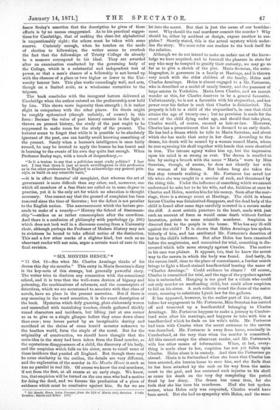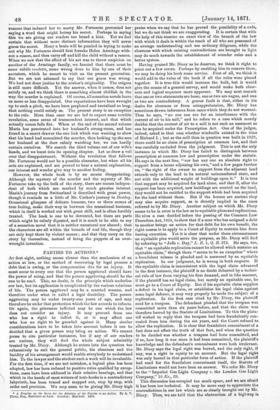" SIX MONTHS HENCE." * " 11 Oct. 18—See what
Mr. Charles Armitage thinks of his dream this day six months." This entry in Maria Secretan's diary is the key-note of this strange, but generally powerful story. The writer tries to disclaim any connection with the sensational school, and it is true that the well-worn devices of bigamy and poisoning, the machinations of schemers, and the counterplots of detectives, which we are accustomed to associate with that class of novels, have no place in the present narrative., But if there is any meaning in the word sensation, it is the exact description of the book. Mysteries which defy guessing, plots elaborately woven and unravelled with tantalizing touches, clouds gathered thickly round characters and incidents, but lifting just at one corner so as to give us a single glimpse before they come down closer than ever ; true lovers parted by an inexplicable destiny and sacrificed at the shrine 0 some horrid monster unknown to the heathen world, form the staple of the novel. But for the originality of construction, we should have thought that the main idea in the story had been taken from the Road murder, as the mysterious disappearance of a child, the discovery of his body, and the suspicion which falls on his sister, seem to recall some of those incidents that puzzled all England. But though there may be some similarity in the outline, the details are very different, and the explanation of the murder in Six Months Hence is such as has no parallel in real life. Of course we know the real murderer, if not from the first, at all events at an early stage. We know, too, that suspicion will be turned on the one man who had a motive for doing the deed, and we foresee the production of a piece of evidence which must be conclusive against him. So far we are
* Six Months Hence, being Passages from the Life of Maria (née) Secretan. 3 vole. London: Smith and Elder. 1870.
let into the secret. But that is just the cause of our bewilder- ment. Why should the real murderer commit the murder ? Why should he, either by accident or design, expose another to sus- picion? Shortly stated, this is the actual mystery which under- lies the story. We must refer our readers to the book itself for the solution.
Although we do not intend to make an unfair use of the know- ledge we have acquired, and to forestall the pleasure in store for any who may be tempted to gratify their curiosity, we may go so. far as to give a sketch of the plot. Maria Secretan, the auto- biographer, is governess in a family at Hastings, and is thrown very much with the elder children of the family, Helen and Charles Armitage. Helen is almost engaged to a Mr. Fortescue, who is described as a model of manly beauty, and the possessor of large estates in Yorkshire. Maria loves Charles, and we cannot- wonder at this, for Charles deserves to be a general favourite. Unfortunately, he is not a favourite with his stepmother, and -her- power over his father is such that Charles is disinherited. The property is left to a child of the stepmother's, in case that child attains the age of twenty-one ; but no provision is made for the event of the child dying under age, and should that take place, Charles would, of course, succeed as heir-at-law. However, Charles 1)as a presentiment that he is doomed to an early death.. He has had a dream which he tells to Maria Secretan, and about- which she has made that entry in her diary. According to the dream, his death will be caused by a woman named Maria, whom he sees squeezing his skull together with hands that seem sheathed• in iron. The intense agony wakes him up, but the impression upon his mind is as strong as ever. The dream is recalled to- him by seeing a brooch with the name " Maria" worn by Miss Secretan, though, of course, he does not identify her with the woman of his dream. But before long she takes the first step towards realizing it. Mr. Fortescue has saved her life when she was caught in a crevice of rock, and threatened by the rising tide. Under the influence of something which we cannot understand he asks her to be his wife, and she, faithless at once to- Charles and Helen, marries him for his money. Soon after the mar- riage, there is a strange event at Hastings. The child in whose favour Charles was disinherited disappears, and the dead body of the is found after some days carefully secreted in a cavern under- the cliff. A most artistic puncture in the heart, made with just such an amount of force as would cause death without further- laceration, points to some scientific murderer. Suspicion is. directed first to the people in the house. Who has any ill-will against the child ? It is shown that Helen Armitage has spoken bitterly of him, and has attributed Mr. Fortescue's desertion of her to the child's influence. But after Helen has been examined before the magistrates, and committed for trial, something is dis- covered which tells more strongly against Charles. The motive in his case was plainer. It appears, too, that he knew the secret- way to the cavern in which the body was found. And lastly, fa the cavern itself, close to the place of concealment, a further search brings to light a blood-stained handkerchief bearing the name of " Charles Armitage." Could evidence be clearer ? Of course, Charles is committed for trial, and the rage of the populace against him is unbounded. Hanging is too good for a villain who could not only murder an unoffending child, but could allow suspicion to fall on his sister. A mob collects round the doors of the assize court, meaning to substitute Lynch law for the gallows.
It has appeared, however, in the earlier part of the story, that before her engagement to Mr. Fortescue, Miss Secretan has carried. off and treasured up a handkerchief belonging to Charles Armitage. Mr. Fortescue happens to make a journey to Cumber- land soon after his marriage, and happens to take with him a handkerchief which he finds on his wife's table. Mr. Fortescue had been with Charles when the secret entrance to the cavern was described. Mr. Fortescue is away from home, nominally in Cumberland, at the very time when the murder is committed.. All this cannot escape the observant reader, and Mr. Fortescue's wife has other means of information. When, at last, every- thing is made clear to her, suspicion has not yet fallen upon Charles. Helen alone is in custody. And then the Fortescues go abroad. Maria is in Switzerland when she hears that Charles has been arrested, she hurries home to save him, and she finds that he has been attacked by the mob on his way from the assize court to the gaol, and has sustained such injuries to his skull as cause his death on the very day completing the period fixed by her diary. The dream has come true, for she feels that she Was been his murderess. Had she but spoken sooner, when Helen only was suspected, Charles would have been saved. But she had no sympathy with Helen, and the same
reasons that induced her to marry Mr. Fortescue prevented her saying a word that might betray his secret. Perhaps in saying this we are giving our readers too broad a hint. Yet we feel certain that without more distinct information they will never _guess the secret. Many a brain will be puzzled in trying to make out why Mr. Fortescue should first forsake Helen Armitage with- out a reason, and then carry off and kill the child without a reason. When we saw that the effect of his act was to throw suspicion on another of the Armitage family, we fancied that there must be some subtle vendetta, some wrong done to him by one of their ancestors, which he meant to visit on the present generation. But we are not ashamed to say that our guess was wrong. We had not done justice to the author's originality. The enigma is still more difficult. Yet the answer, when it comes, does not satisfy us, and we think there is something almost childish in the way the murder is explained. Of course, all sensation novels leave us more or less disappointed. Our expectations have been wrought up to such a pitch, we have been perplexed and tantalized so long, that nothing could satisfy us. The present story is no exception to the rule. More than once we are led to expect some terrible revelation, some scene of transcendent interest, and that which actually comes falls flat. When at the end of the second volume Maria has penetrated into her husband's strong-room, and has found in a secret drawer the one link which was wanting to show that his hand had committed the murder, then looking up she sees her husband at the door calmly watching her, we can hardly .contain ourselves. We snatch the third volume out of our wife's hands, and we burst into its opening chapter. Let us draw a veil over that disappointment. Without the revelation that follows Mr. Fortescue would not be a possible character, but when all his acts are explained, and are proved to bear a natural explanation, our interest and wonder give way to another feeling.
However, the whole book is by no means disappointing. Although the mystery of the murder and the mystery of Mr. Fortescue take up the bulk of the story, there are scenes indepen- dent of both which are marked by much genuine interest. Maria's journey from Switzerland is described with great power, though it reminds us a little of Mr. Carker's journey in Dombey. Occasional glimpses of delicate humour, two or three scenes of true feeling, make their way in between the sensational business, which in itself is worked out with great skill, and is often forcibly treated. The book is one to be devoured, but there are parts which might be calmly digested, and it is much to be able to say of a sensation novel that it is neither unnatural nor absurd ; that the characters are all within the bounds of real life, though they are only kept there by violent means ; and that they carry on the story by themselves, instead of being the puppets of an over- wrought invention.



































 Previous page
Previous page